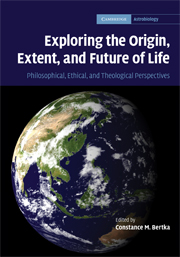 Exploring the Origin, Extent, and Future of Life
Exploring the Origin, Extent, and Future of Life Book contents
- Frontmatter
- Contents
- List of contributors
- Acknowledgements
- 1 Astrobiology in a societal context
- Part I Origin of life
- Part II Extent of life
- Part III Future of life
- 13 Planetary ecosynthesis on Mars: restoration ecology and environmental ethics
- 14 The trouble with intrinsic value: an ethical primer for astrobiology
- 15 God's preferential option for life: a Christian perspective on astrobiology
- 16 Comparing stories about the origin, extent, and future of life: an Asian religious perspective
- Index
- References
14 - The trouble with intrinsic value: an ethical primer for astrobiology
from Part III - Future of life
Published online by Cambridge University Press: 29 December 2010
- Frontmatter
- Contents
- List of contributors
- Acknowledgements
- 1 Astrobiology in a societal context
- Part I Origin of life
- Part II Extent of life
- Part III Future of life
- 13 Planetary ecosynthesis on Mars: restoration ecology and environmental ethics
- 14 The trouble with intrinsic value: an ethical primer for astrobiology
- 15 God's preferential option for life: a Christian perspective on astrobiology
- 16 Comparing stories about the origin, extent, and future of life: an Asian religious perspective
- Index
- References
Summary
Introductory comments
A philosopher always needs to know his audience. In this case, I am going to assume that most readers of this piece will be scientists and engineers working in the space sciences – that is, non-philosophers who have relatively little familiarity with ethics as a field of study. Certainly we all know about ethics in the sense that we all know it has to do with rules about our behavior, especially our behavior towards other people. In this sense, ethics is rather similar to evolution – people think they know what it is because they understand the basic idea. However, there is much more to ethics than can be summarized in a few rules of behavior, just as there is much more to evolution than can be captured in a paragraph explaining natural selection.
My goal here is thus not so much to break new ground as to discuss some basic concepts in ethics which are often misunderstood in such a way as to block fruitful ethical discussion. Indeed, it is quite common for people to adhere to views which actually undercut the whole ethical enterprise without even realizing this. So I will begin this article by discussing some extremely common confusions about what ethics is and isn't. Then I will discuss a few basic ways of assigning moral value, trying to show the disadvantages of intrinsic value assignments as they are often used in environmental ethics contexts such as astrobiology.
- Type
- Chapter
- Information
- Exploring the Origin, Extent, and Future of LifePhilosophical, Ethical and Theological Perspectives, pp. 261 - 280Publisher: Cambridge University PressPrint publication year: 2009
References
- 25
- Cited by
